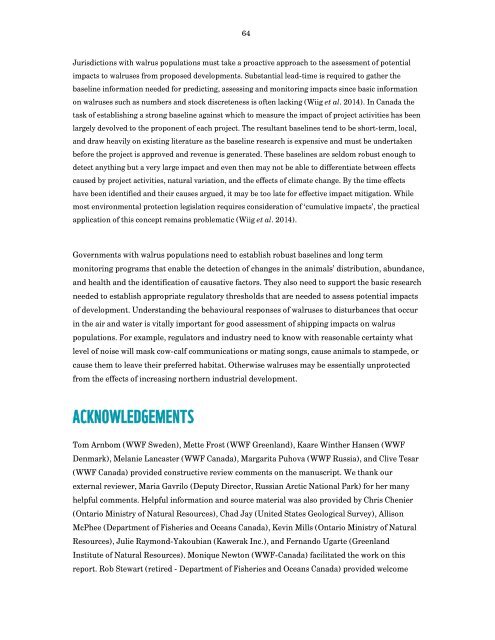The State of Circumpolar Walrus Populations
walrusreport
walrusreport
You also want an ePaper? Increase the reach of your titles
YUMPU automatically turns print PDFs into web optimized ePapers that Google loves.
64<br />
Jurisdictions with walrus populations must take a proactive approach to the assessment <strong>of</strong> potential<br />
impacts to walruses from proposed developments. Substantial lead-time is required to gather the<br />
baseline information needed for predicting, assessing and monitoring impacts since basic information<br />
on walruses such as numbers and stock discreteness is <strong>of</strong>ten lacking (Wiig et al. 2014). In Canada the<br />
task <strong>of</strong> establishing a strong baseline against which to measure the impact <strong>of</strong> project activities has been<br />
largely devolved to the proponent <strong>of</strong> each project. <strong>The</strong> resultant baselines tend to be short-term, local,<br />
and draw heavily on existing literature as the baseline research is expensive and must be undertaken<br />
before the project is approved and revenue is generated. <strong>The</strong>se baselines are seldom robust enough to<br />
detect anything but a very large impact and even then may not be able to differentiate between effects<br />
caused by project activities, natural variation, and the effects <strong>of</strong> climate change. By the time effects<br />
have been identified and their causes argued, it may be too late for effective impact mitigation. While<br />
most environmental protection legislation requires consideration <strong>of</strong> ‘cumulative impacts’, the practical<br />
application <strong>of</strong> this concept remains problematic (Wiig et al. 2014).<br />
Governments with walrus populations need to establish robust baselines and long term<br />
monitoring programs that enable the detection <strong>of</strong> changes in the animals’ distribution, abundance,<br />
and health and the identification <strong>of</strong> causative factors. <strong>The</strong>y also need to support the basic research<br />
needed to establish appropriate regulatory thresholds that are needed to assess potential impacts<br />
<strong>of</strong> development. Understanding the behavioural responses <strong>of</strong> walruses to disturbances that occur<br />
in the air and water is vitally important for good assessment <strong>of</strong> shipping impacts on walrus<br />
populations. For example, regulators and industry need to know with reasonable certainty what<br />
level <strong>of</strong> noise will mask cow-calf communications or mating songs, cause animals to stampede, or<br />
cause them to leave their preferred habitat. Otherwise walruses may be essentially unprotected<br />
from the effects <strong>of</strong> increasing northern industrial development.<br />
ACKNOWLEDGEMENTS<br />
Tom Arnbom (WWF Sweden), Mette Frost (WWF Greenland), Kaare Winther Hansen (WWF<br />
Denmark), Melanie Lancaster (WWF Canada), Margarita Puhova (WWF Russia), and Clive Tesar<br />
(WWF Canada) provided constructive review comments on the manuscript. We thank our<br />
external reviewer, Maria Gavrilo (Deputy Director, Russian Arctic National Park) for her many<br />
helpful comments. Helpful information and source material was also provided by Chris Chenier<br />
(Ontario Ministry <strong>of</strong> Natural Resources), Chad Jay (United <strong>State</strong>s Geological Survey), Allison<br />
McPhee (Department <strong>of</strong> Fisheries and Oceans Canada), Kevin Mills (Ontario Ministry <strong>of</strong> Natural<br />
Resources), Julie Raymond-Yakoubian (Kawerak Inc.), and Fernando Ugarte (Greenland<br />
Institute <strong>of</strong> Natural Resources). Monique Newton (WWF-Canada) facilitated the work on this<br />
report. Rob Stewart (retired - Department <strong>of</strong> Fisheries and Oceans Canada) provided welcome


